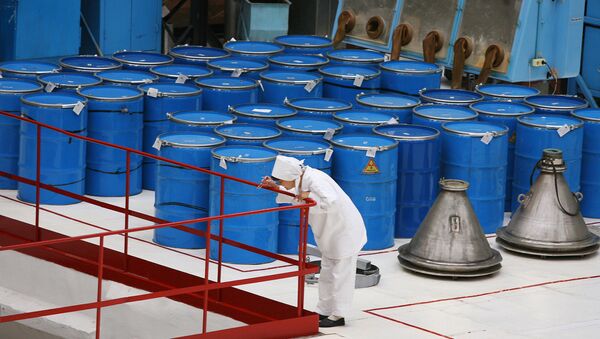MOSCOW, November 13 (Sputnik) — As the 15th session of the CIS Commission on Peaceful Uses of Atomic Energy is coming to an end, member states have achieved notable progress and are set to continue their work towards harmonizing nuclear legislation and meeting international standards, say experts interviewed by Sputnik.
“We have moved on from this declarative stage, where we had to gather experts, make plans. This is all very difficult, because every CIS country has its own nuclear legislation, and before starting any specific work it is necessary to very carefully examine the legislation of each country,” said Alexander Mikhalevich, Deputy Academic Secretary of the Physics and Technology Sciences Department of the National Academy of Sciences of Belarus.
“During this session we discussed for the first time specific results. This was related, for example, to the rehabilitation of contaminated areas in Tajikistan and Kyrgyzstan, of so-called uranium tailings, waste byproducts from uranium mining,” he told Sputnik.
“A very good job was done by the [expert] group for training of physics engineers for the healthcare sector, training of medical personnel and the training of staff to work with sources of ionizing radiation. So it has been a very busy year since the last meeting of the committee, it has brought a lot of specific and useful results,” he added.
According to Mikhalevich, the commission seeks to harmonize local laws and regulations with the requirements of the International Atomic Energy Agency (IAEA).
“We want our regulatory framework in the field of radioactive waste management and the use of radiation sources not only in nuclear energy, but also in the healthcare sector, agriculture and industry, to comply with international standards and the recommendations outlined by the IAEA,” he said.
The commission has decided “not to create any particularly new directions” and instead focus on the existing ones in the upcoming year, Mikhalevich stated.
“This is due to both human resources and financial resources. We hope to finish what we have planned, and we specifically discussed this matter and decided not to create any new directions before we complete the existing ones,” he explained.
However, one new area of work for the commission could be an increased cooperation with Kazakhstan, which is set to build a nuclear power plant.
“When Belarus decided to build a nuclear power plant, its cooperation with Russia, for example, was strengthened. We have a cooperation program which includes bilateral agreements, bilateral contracts, and not only multilateral cooperation within CIS,” Mikhalevich said.
He also noted that the commission, which is currently headed by Nikolay Spassky, Deputy CEO of Russia’s Rosatom nuclear agency, will soon be led by Belarusian Deputy Energy Minister Mikhail Mikhaduk. "It is quite important to note that the commission will be headed by someone from outside Russia," he said.
The session was attended by representatives of seven countries, namely Russia, Armenia, Azerbaijan, Kyrgyzstan, Kazakhstan, Tajikistan and Belarus, Mikhalevich told Sputnik. “Georgia was not there, Ukraine was not there, Moldova was not there," he said.
Answering a question of whether there could be political reasons behind Ukraine’s absence, he stated that “they may be following Georgia’s example, it is difficult to predict now. But Ukraine was not present and that is a fact”.
Mikhalevich stressed, however, that every state has the right to decide whether it wishes to participate, and that “Turkmenistan, for example, did not attend either”.
Though neither this year’s nor last year’s commission sessions were attended by Ukraine, there is no need to worry about its nuclear safety, said Andrey Baklitskiy, Russia and Nuclear Non-proliferation Program Director at the Moscow-based PIR Center.
“Regarding Ukrainian nuclear power plants' safety, these days we don't have any reasons to be worried. The cooperation in the nuclear field between Ukraine and Russia is still going strong. The Russian side supplies nuclear fuel to Ukrainian NPP's without delays. Rosatom fully cooperates with Ukrainian colleagues,” he told Sputnik.
“It is very important to continue normal process in the nuclear cooperation. All CIS countries still remember the Chernobyl tragedy,” he added.
However, “it is clear that Kiev will do everything to avoid nuclear dependency” from Russia, Baklitskiy stated.
“Ukraine is negotiating with America's Westinghouse fuel cycle company on the possibility to supply its product to Ukraine. Actually, Westinghouse has already supplied nuclear fuel to Ukraine’s Energoatom nuclear power generator company,” he said.
“Switching to a new supplier is a long process,” Baklitskiy said, noting that “Ukrainian specialists will need to run a lot of tests and all of them need to be done under the supervision of the International Atomic Energy Agency (IAEA)”.
“Westinghouse also will not be pushing for fast track. Westinghouse is a private company and cares for its reputation. The company is interested in a safety of their fuel cycle supplies. It is a long process and we don't have to worry about it now," he told Sputnik.
The 15th session of the Commission of CIS Member States on Peaceful Uses of Atomic Energy took place Minsk, Belarus from November 11 to November 13.



